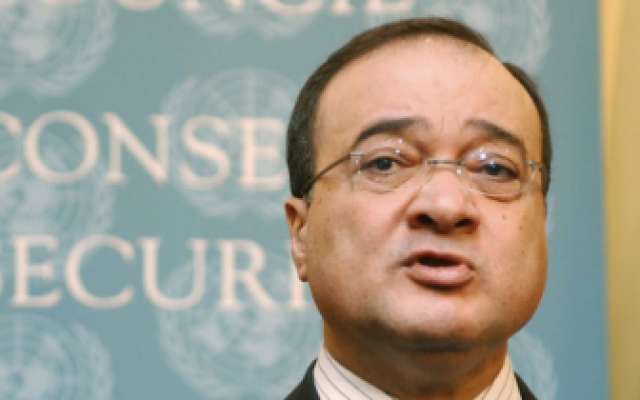Fatah Central Committee member Nasser al-Qidwa on Wednesday declared his support for a separate bloc to run in the scheduled Palestinian elections, in the latest blow to the unity of the West Bank’s ruling faction.
“I am in favor of forming an electoral slate within the framework of a broad democratic forum that includes various segments of society, not the Fatah movement alone,” al-Qidwa wrote on Twitter.
Palestinian Authority President Mahmoud Abbas issued a decree in mid-January ordering the Palestinians to head to elections. If held, they would be the first Palestinian national elections in 15 years. The first voting round, the legislative elections, is set to be held on May 22.
Many observers were skeptical that the Palestinians would actually head to elections, given years of failed electoral promises by the Palestinian leadership. But the suspicion is slowly growing in diplomatic circles that this time, it may actually happen.

In this October 20, 2012, photo, Palestinian Authority President Mahmoud Abbas shows his ink-stained finger after casting his vote during local elections at a polling station in the West Bank city of Ramallah. (AP/Majdi Mohammed)
Al-Qidwa and other activists call their new slate the National Democratic Forum. In a tweet, Al-Qidwa said he hoped that convicted Palestinian terrorist Marwan Barghouti “will stand at the head of it.”
Barghouti, who has yet to formally declare his candidacy, is currently serving five life sentences in an Israeli prison for masterminding terror attacks during the Second Intifada.
Al-Qidwa had previously called on Barghouti not to “hide from his responsibility” to get involved in the Palestinian legislative elections.
Al-Qidwa also called for former Gaza security chief Mohammad Dahlan’s faction, the Democratic Reform Current, to play a renewed role in Palestinian politics, including within Fatah itself. Dahlan, who was exiled from the West Bank in 2011, has long been at odds with the Ramallah-based Palestinian leadership.
“I want to say to the main Fatah faction: [Dahlan’s faction] has a place, and they are welcome as part of the reconciliations within Fatah and outside Fatah,” al-Qidwa reportedly said.
Palestinian leaders have repeatedly promised to hold elections since the last vote was held in 2006. Hamas swept the Palestinian parliament in a landslide victory over its Fatah rivals, who were riven by factional squabbles and widely seen as corrupt.
The terror group’s victory led to a fragile unity government between Fatah and Hamas. Following an international boycott, the unity government collapsed; the two rival Palestinian movements then conducted a bloody struggle for supremacy in Gaza.

Nasser al-Kidwa in 2012 (photo credit: AP)
Hamas again emerged triumphant, leading to the long-running rift in Palestinian politics. Fear and mistrust between the two factions — combined with a desire to avoid losing power — have torpedoed every feint toward elections over the past 15 years.
Much as in 2006, Abbas’s Fatah movement is deeply divided, and he faces rivals at every turn, including Barghouti and Dahlan. Barghouti enjoys broad popularity among the Palestinian public, while Dahlan has a loyal faction in Gaza and a powerful patron.
Al-Qidwa has also long been a critic of Abbas. He has worked at several foreign posts, including as the PA’s envoy to the United Nations, where he developed a reputation as an effective and capable diplomat.
In recent weeks, however, al-Qidwa’s criticism of the PA has become more strident. At a virtual conference streamed by Birzeit University in late February, al-Qidwa said the Palestinian political system needed to be changed, not only reformed.
“We need radical change in our political system, even as we struggle against Israeli actions,” al-Qidwa said.
Al-Qidwa called for Palestinians to find what he called “a third path” between the dichotomy of “armed struggle or negotiations with unending concessions” in which he claimed Palestinian politics found itself. Pressed for more details, he dodged.
In a phone call with The Times of Israel last week, Fatah Central Committee member Azzam al-Ahmad scoffed at al-Qidwa’s remarks that the Palestinian political regime needed fundamental change.
“Nasser is a part of the political system, and we have a strong relationship as members of the Central Committee,” al-Ahmad said in a phone call.
Should the vote take place, Fatah’s factional differences may have less impact than they did in 2006. In a concession by Hamas, the terror group assented to Fatah’s demand that a national popular vote would determine the division of seats in the Palestinian parliament.
In 2006, numerous Fatah candidates ran against one another in different districts, splitting the ticket. The internally disciplined Hamas ran only one candidate per district. The result was an electoral landslide by Hamas despite only a slight victory over Fatah in the popular vote.
Senior Palestinian Authority official Ahmad al-Majdalani told The Times of Israel that the new elections procedure would prevent a landslide by Hamas or any other faction.
“The new elections law prevents any side from achieving a majority in the legislative elections. Every faction will need to make alliances — either within the framework of the elections or afterward,” Majdalani said.
 RSS Feed
RSS Feed















 March 4th, 2021
March 4th, 2021  Awake Goy
Awake Goy  Posted in
Posted in  Tags:
Tags: 













